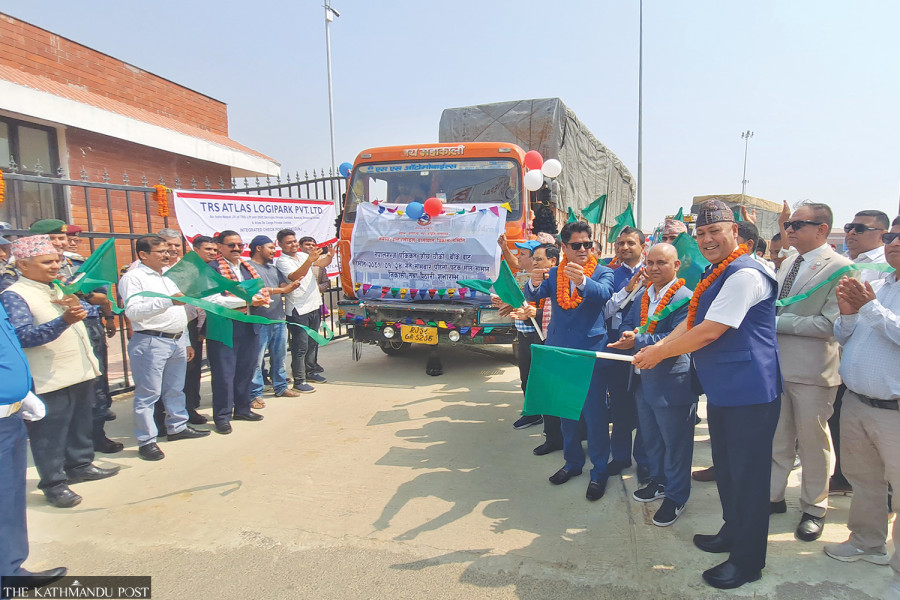National
Traders happy as Nepalgunj ICP comes into operation
India built the facility with a grant of Rs3.2 billion and handed it over to Nepal on Monday.
Rupa Gahatraj
Industrialists and traders have expressed their happiness at the opening of the integrated check post (ICP) in Nepalgunj.
On Monday, the ICP was formally inaugurated nearly two decades after an agreement between Nepal and India to build the facility to promote trade. It took six years for the construction.
The facility spread over 88 bighas in Rupaidiha (India) and Nepalgunj on the Nepal-India border was inaugurated by Minister for Industry, Commerce and Supplies Damodar Bhandari. To begin with, two trucks loaded with plywood were sent to India from Nepal.
“The facility will ease trade. It will also control illegal trade and increase the country’s revenue,” Bhandari said.
Dhundi Prasad Niraula, director general of the Department of Customs, said that the modern facility would ease imports and exports. “The one-window system we have adopted at the new facility will facilitate all stakeholders.”
The technology gives digital access to various trade‑related services like obtaining the licences, permits and certificates required for various trading activities, making payments, electronic submission of documents and access to relevant trading information.
Dhurba Raj Biswakarma, chief of the Nepalgunj Customs, said the ICP can accommodate 200 trucks for import and 75 trucks for export. It has buildings for customs, immigration, quarantine, security and bank.
Tanka Dhami, president of the Banke Chamber of Commerce, said that the ICP’s operation will ease trade between the two countries. “It has ended the hassle of going 10 places to import goods. The ICP’s operation has eased trading and saved time,” he said.
Traders say that the facility would benefit them by reducing the queues of cargo trucks at the border point.
The projects were mooted when prime minister Sher Bahadur Deuba paid an official visit to India in September 2004 at the invitation of his Indian counterpart Manmohan Singh.
The agreement for the construction of the ICPs was reached in August 2005 at the following points of the Indo-Nepal border—Biratnaga-Jogwani (India), Birgunj-Raxaul (India), Bhairahawa-Sunauli (India) and Nepalgunj-Rupaidiha (India).
The construction of the first ICP in Nepal, at Birgunj and Biratnagar, was approved in August 2009 with funding from the Indian foreign ministry.
Krishna Prasad Shrestha, former central member of the Federation of Nepalese Chambers of Commerce and Industry, said that the new facility brings excitement to the private sector.
“It will facilitate trade by easing cross-border congestion and reduce smuggling.”
He said that the goods need to be brought through customs, while the Jamuna border point should be used only for passenger movement.
ICP has been constructed on both sides of the Nepal-India border. The infrastructure was developed by the Indian government for a grant of Rs3.2 billion on the land provided by the Nepal government.
In January 2019, Raj Nath Singh, the defence minister of India, laid the foundation of the ICP construction on the India side.
After two years, the Nepali side laid the foundation stone on its side. The construction started in September 2020.
Last year, Prime Minister Pushpa Kamal Dahal and his Indian counterpart Narendra Modi inaugurated the ICP remotely.
On Monday, India handed over the infrastructure to the Nepal Intermodal Transport Development Committee.
In July last year, the committee invited bids for the ICP’s operation under the public-private partnership model.
The facility was awarded to TRS Atlas Logipark Pvt Ltd after its completion.
Ashish Gajurel, executive director of the Nepal Intermodal Transport Development Committee, said the ICP boasts all facilities such as customs, banks, quarantine, management company and immigration to help traders complete all requirements within the ICP premises.
“For instance, if traders import or export food grains, the quarantine service is available at ICP for quality checks. If traders import or export plants, plant quarantine is availability too,” said Gajurel. “All transactions and documentation are made online.”
“Customs clearance will take a few hours now,” Gajurel said. It normally took a day for customs clearance earlier.
Gajurel said that around 400 people work at the Nepalgunj ICP.
According to the committee, eight ICPs are in operation currently— two ICPs in Birgunj, and one each in Biratnagar, Kakarvitta, Bhairahawa, Nepalgunj, Tatopani and Chobhar.




 8.54°C Kathmandu
8.54°C Kathmandu















